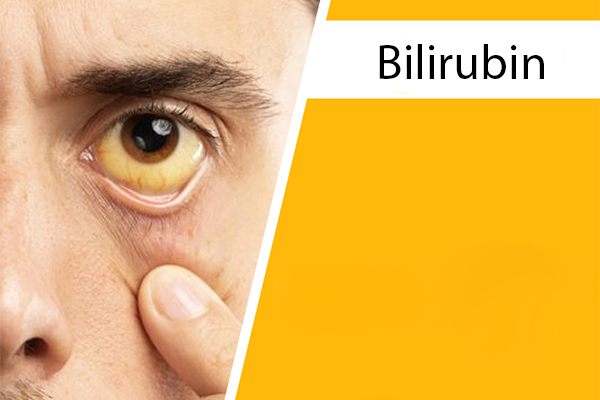What is Bilirubin?
Bilirubin is the yellowish pigmented bile that is secreted by our liver present in the vertebrate and this is responsible for giving color to the solid waste product. It is basically produced in the cells of bone marrow and in the liver as the end product of hemoglobin breakdown. There are two types of bilirubin produced by the liver which includes:-
- Unconjugated Bilirubin is produced during the catabolism of haem after the removal of iron which is one of its components. The human body produces 250-300mg unconjugated bilirubin on the daily basis.
- Conjugated Bilirubin:- It is excreted in the form of stool or urine.
Unconjugated bilirubin usually moves freely in the bloodstream and is attached to protein and albumin. It then gets conjugated with glucuronic acid which is made from the sugar glucose. After that, it is concentrated for about 1,000 times found in blood plasma. This bilirubin then passes into the gallbladder where it is concentrated more and mixed with other biles. There are chances of developing stone originating from the bilirubin and there are chances of bacterial infection seen in the gallbladder.
The normal range of Bilirubin:- 0.3 and 1.2 milligrams per deciliter (mg/dL) more than that is considered high.

What Causes High Levels of Bilirubin
The condition having high levels of bilirubin is known as hyperbilirubinemia and it is the sign of the underlying condition. Common symptoms noted in high bilirubin is a yellowish pigmentation of the skin along with:-
- Abdominal swelling
- Fever
- Chills
- Pain in Chest
- Weakness
- Vomiting
- Urine becomes dark.
Conditions that can lead to High Bilirubin are
- Jaundice: It is the condition very commonly known for causing yellowish pigmentation of skin and sclera. 60 percent of newborn babies are seen with jaundice. It indicated a problem in the bile duct or liver.
- Gilbert’s Syndrome: It is a genetic condition of the liver, causing it to produce improper levels of bilirubin in the body. This causes the bilirubin to accumulate in the bloodstream. Common symptoms seen in gilbert syndrome are:-
- Nausea
- Vomiting
- Diarrhea
- Jaundice
- Abdominal discomfort
- Gallstones: It is seen when substances like bilirubin get hardened in the gallbladder. The gallbladder is responsible for producing bile (digestive fluid) which helps in breaking down the fat so that it can enter into the intestine.
Symptoms seen in gallstone are:-- Aching sensation in the upper right abdomen or below the chest.
- Sick feeling
- Feels to throw up (Nausea)
- Pain the shoulder
- Hepatitis: It is the condition causing the liver to swell which is often caused by some viral infection. When the liver is inflamed it’s difficult for them to continue the process of bilirubin resulting in the accumulation of bilirubin in the blood.This leads to symptoms like:-
- Exhaustion
- Urine becomes dark
- Nausea
- Vomiting
- Pain in abdomen
- Jaundice
- Bile Duct Inflammation: The bile duct is connected to the liver which helps it in connecting with the gallbladder. They help in moving biles containing bilirubin throughout the body from the gallbladder and liver into the intestine. When these ducts get inflamed, the bile is not drained properly. This includes symptoms like:-
- Dark urine
- Stool appears pale
- Jaundice
- Itching
- Vomiting
- Nausea
- Extreme weight loss
- Fever
- Hemolytic Anemia: It happens when blood cells break down very quickly in the bloodstream. It is an autoimmune condition resulting in an enlarged spleen and infection. This shows symptoms like:-
- Weakness
- Difficulty in breathing
- Dizziness
- Pain in abdomen
- Pain in chest
- Jaundice
- Cold feet and hands
- Headache
- Intrahepatic Cholestasis of Pregnancy: It is a temporary condition caused during the last trimester of pregnancy. It causes the bile to drain into the liver which slows down the process. This makes it harder for the liver to process bilirubin from the blood which results in high levels of bilirubin. Common symptoms seen are:-
- Rashes in hands which causes itching
- Jaundice
- Vomiting
- Nausea
- Abdominal pain
What Causes Low Levels of Bilirubin
It is also known as Hypobilirubinemia and there are certain causes that lead to low bilirubin levels. There are certain substances like caffeine, barbiturates, and Nonsteroidal anti-inflammatory drugs like aspirin and salicylates which are responsible for causing the decreased levels of bilirubin. There are potential risk factors that can result in low bilirubin and this includes:-
- Ulcerative Colitis: This condition results in chronic inflammation resulting in damage of the digestive tract. It is suggested that it might lead to hyperbilirubinemia making it harder for the body to remove reactive oxygen species.
- Coronary Artery Disease: This causes damage to the artery present on the heart which is responsible for providing oxygen. It is confirmed by research that coronary disease patients suffer from low levels of bilirubin.
- Strokes: This is caused by the blood vessel damage and it is associated with low levels of bilirubin.
Preventive Tips to Manage the Healthy Levels of Bilirubin
- Drink an adequate amount of water and consume at least eight glasses of water. It will help in flushing out the toxins from the liver. It helps in maintaining weight and making it easier for the liver to filter blood.
- Moderate amount of herbal tea will help in reducing the risk of developing cirrhosis and lowering the levels of harmful enzymes. According to researchers drinking coffee or herbal tea helps in reducing stiffness from the liver.
- Eat natural products like honey, pineapple, papaya, mango, and orange peels which help in regulating the digestive enzyme and inturn balancing the bilirubin level.
- Include fruits, vegetables, legumes, nuts, whole grain which are a rich source of fibers which will help in enhancing the movement of bile.
- Do not include sugar or coffee in your diet
- Avoid the consumption of alcohol which is also responsible for causing a high level of bilirubin in the blood.
- Eat smaller meals throughout the day.
- Instead of simple salt try seasoning food with lemon juice or other spices.
- Try substitute for whole milk, instead include almond milk, coconut milk, etc.
- Avoid foods that are high in sugar or salt levels also helps to Manage the Healthy Levels of Bilirubin.
Conclusion
The above mentioned is the information about bilirubin and its effect on the body. It is important to maintain the bilirubin levels and through a healthy lifestyle, one can achieve good health. Try applying above mentioned tips to avoid high or low levels of bilirubin in the body.























